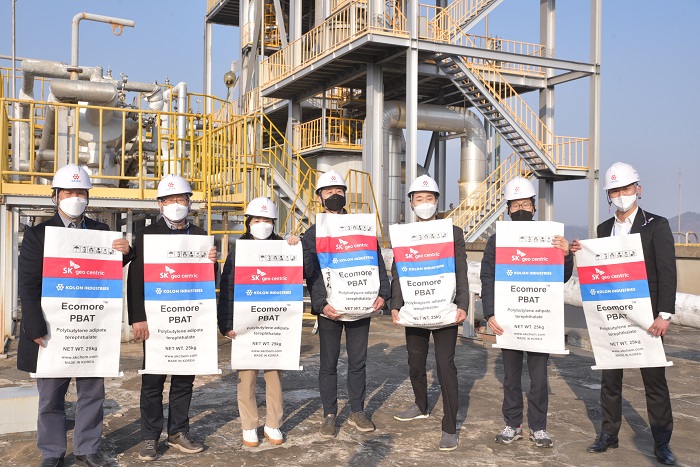In collaboration with Kolon Industries, SK Geo Centric (SKGC), a subsidiary of SK Innovation, announced that it is going to commercialize and launch PBAT, an eco-friendly biodegradable plastic material.
PBAT (Polybuthylene Adipate-co-Terephthalate) is an environmentally friendly plastic that degrades swiftly in nature due to oxygen, heat, light, and enzyme reactions. SK Geo Centric has been working with Kolon Industries on joint research and development since last year, and was able to launch a commercialized product in just eight months after signing a strategic partnership agreement in April, which was followed by the development of prototype products and the acquisition of an eco-label certificate EL724).
SK Geo Centric is expanding its client base through supplying PBAT raw materials and its marketing expertise and network. SK Geo Centric is South Korea’s only producer of 1,4-Butanediol, a key ingredient in PBAT as well as a variety of fabrics, plastics, and electro-chemical substances.
Kolon Industries, on the other hand, has a high level of technological prowess in producing polyester products and will produce high-quality PBAT at Gumi Plant by combining both companies’ technological skills in terms of optimum temperature, ideal material mixing ratios, and other factors, based on a reliable supply of PBAT raw material.
While regular plastic takes over a century to disintegrate in the natural environment, PBAT decomposes by more than 90% in just six months after being buried. Consequently, it makes it a highly eco-friendly plastic substance. It can be used in a variety of disposable bags and agricultural plastic mulching films, to name a few, due to its quick decomposition speed and flexibility.
In particular, it can have a similar strength to existing plastic films such as LD and LLDPE when it is coupled with other components such as harder PLA (Poly Lactic Acid) starch. It also has excellent printability and workability, allowing it to be used for a variety of packaging purposes. Because PBAT is biodegradable in natural soil, it is expected to be utilized in place of existing PE agricultural films, which are problematic due to their collecting issues.
The Gumi plant has a PBAT production capability of 3000 tons per year. According to the industry, the global PBAT market will expand from 220,000 tons in 2020 to 800,000 tons in 2025, as demand for biodegradable products grows exponentially in response to increasingly stringent environmental regulations. Working with Kolon Industries, SK Geo Centric intends to boost its manufacturing scale to 60,000 tons by 2020 to meet rising demand in the global biodegradable plastic market.
“We believe PBAT will have a broad application in the future since, due to its flexibility and rapid decomposition rate, it is harmless to the environment when buried to the ground,” said Kang Dong-hoon, Vice President of SK Geo Centric’s Green Biz Group. “We will accelerate our ‘Carbon to Green’ strategy by churning out more eco-friendly chemical products.”
“We are ecstatic to be able to contribute to the solution of environmental problems by mass-producing biodegradable plastics, especially because plastic waste has been identified as one of the major sources of pollution,” said Lee Bum-han, Head of Kolon Industries’ Technical Division. “We will accelerate our ESG management in order to position ourselves as an environmental company that opens the door to a sustainable future.”
